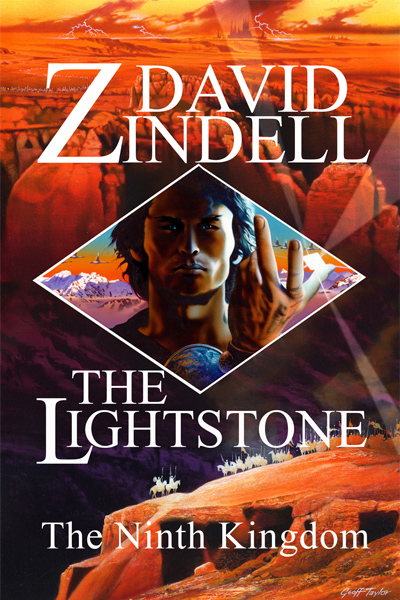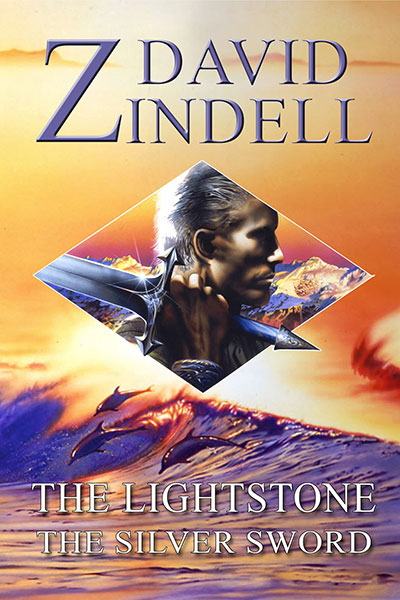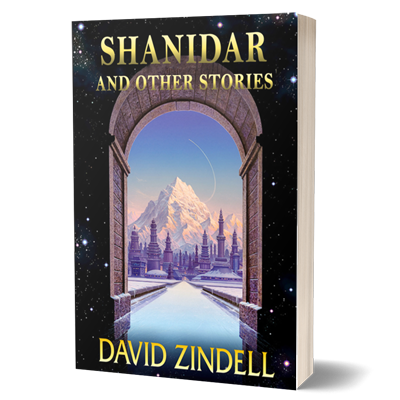 I love fantasy in a way that I do not love science fiction. I do not love it to a greater degree, any more than a father devotes himself to one child over another, but something about fantasy enchants me as no other kind of writing quite does. It’s been said that science fiction is a literature of ideas, whereas fantasy concerns myth and magic. That is only partly true. If we go deep enough into the material universe, we will discover a mystery so profound that we’d have to be made of stone not to sense that matter is made of magical stuff. Science fiction, in a hundred ways, explores the heart of this mystery through ideas, mostly framed and played out in a scientific context. Fantasy does the same thing more viscerally. It’s not that fantasy doesn’t have ideas all its own, for it can’t help having them. But fantasy ideas are played out in a fantasy context.
I love fantasy in a way that I do not love science fiction. I do not love it to a greater degree, any more than a father devotes himself to one child over another, but something about fantasy enchants me as no other kind of writing quite does. It’s been said that science fiction is a literature of ideas, whereas fantasy concerns myth and magic. That is only partly true. If we go deep enough into the material universe, we will discover a mystery so profound that we’d have to be made of stone not to sense that matter is made of magical stuff. Science fiction, in a hundred ways, explores the heart of this mystery through ideas, mostly framed and played out in a scientific context. Fantasy does the same thing more viscerally. It’s not that fantasy doesn’t have ideas all its own, for it can’t help having them. But fantasy ideas are played out in a fantasy context.
Superior beings in my fantasy universe, for example, look and feel different from those of my far-future universe of Neverness. In my writing, as in my life, two overarching ideas have fascinated me: evolution and God. Sometimes I see all my work as an attempt to understand the relationship between them.
In my Ea universe, the drive to evolve fires every bit of the cosmos. On many earthlike worlds across Eluru, human beings have come forth from the stuff of those worlds. They are warlike men (and often women), primitives really, and I call them the Ardun. They struggle to make and wield the highest technology of their universe: the “magic” crystals known as the gelstei. When they have mastered the kristei and the silustria, the lilastei and the firestones and the black jade and all the others – and more importantly, when they have begun to gain mastery over themselves – they attain the power to walk among the stars. And so they become Valari. Further disciplines of the mind, body and soul raise up the Valari to the order of the Elijin: ageless beings who cannot die natural deaths but who can nevertheless be killed. The Galadin, who are what the most advanced Elijin become when they have progressed far enough in their self-perfection, cannot be killed. They gain mastery over material reality in a way that appears magical to the ignorant Ardun. They bestride the very heavens as gods.
In The Broken God, as pure a piece of science fiction as I know how to write, I describe in detail the education of Danlo wi Soli Ringess: how he learns languages and mathematics and the cybernetic senses. And more, how meditative and mystical disciplines enable him to gain a singular power. I describe the mechanisms of this personal evolution. In my fantasy novels, it feels more fitting simply to show my people in action without explaining exactly how an Ardun becomes a Valari, who becomes an Elijin, who becomes a Galadin. I am more concerned with the magic. I like, too, in fantasy, the directness of which I spoke earlier, the immediacy of a more natural world. Think of the things of our world: telephones: Novocain at the dentist; web cam girls; certificates of deposit; paperback books; fast food drive-throughs; flush toilets. Not only are they commonplace and therefore boring to read about, but they all in one way or another abstract the world or soften certain basic experiences, thus making reality less real. In the future, where authors usually set science fiction stories, the situation becomes even worse, for we have instead: “telepathy” through implanted neural chips; decay-proof, bio-engineered teeth; the dildonics of cyber sex; electronic money; e-books; food synthesizers; virtual bodies that don’t need to excrete. Too often, in reading such stories, I have become lost in virtual realities that feel nauseatingly unreal.
I like, too, in fantasy, the directness of which I spoke earlier, the immediacy of a more natural world. Think of the things of our world: telephones: Novocain at the dentist; web cam girls; certificates of deposit; paperback books; fast food drive-throughs; flush toilets. Not only are they commonplace and therefore boring to read about, but they all in one way or another abstract the world or soften certain basic experiences, thus making reality less real. In the future, where authors usually set science fiction stories, the situation becomes even worse, for we have instead: “telepathy” through implanted neural chips; decay-proof, bio-engineered teeth; the dildonics of cyber sex; electronic money; e-books; food synthesizers; virtual bodies that don’t need to excrete. Too often, in reading such stories, I have become lost in virtual realities that feel nauseatingly unreal.
Fantasy, by definition the least realistic of all literature, ironically works to heighten our sense of the world. That is one reason it typically employs a level of technology that feels Medieval at best. And so a hero moving through a fantasy earth might find these things: letters sent by carrier pigeons (or owls); pliers pulling rotten teeth in streetside stalls; whores in colorful silks; leather purses full of jangling gold coins; scrolls of mildewed parchment; the butcher’s shop displaying legs of lamb aswarm with buzzing flies; potfuls of piss and steaming dung flung out of windows onto cobblestone streets.
With great power, fantasy not only engages the senses but something deep inside the soul. We who write it do not need to work out elaborate extrapolations of technology and culture or to interweave hard-to-explain scientific ideas with character, theme and plot. This frees us to concentrate on the story. Of all fiction, fantasy comes the closest to being pure story. In a way, the myths from which it springs breathe life into all the manifold stories we know. I often think of it as the Ur-story of the human race.
And that story, in fantasy, often plays out through some sort of a quest. How not, since the essential story of our kind involves a quest to become as gods? We humans are always looking for something more, whether that be a ring power, an elixir bestowing immortality or the Holy Grail.
The Lightstone, of course, the cup of gold gelstei that a Valari starwalker once brought to Ea, is just the Grail by another name. In The Lightstone,Valashu Elahad joins in a great quest to reclaim it. He, a son of kings, of a people who worship their swords as their souls, will have to fight many battles along the way. He must become a master of war. He finds his fate in slaying many with his long, silver sword.
I have always hated war, and I wanted to make it as hard as I could for poor Valashu. And so I created him with a love of poetry and peace. And more, I bestowed up him the gift of valarda. That ancient word means the “heart of the stars.” Human beings, as Valari, all came from the same home out in the stars; we are all made out of the fire of the stars and we are all interconnected. Some rare beings, like Valashu, sense this with a great poignancy. Any sensation or emotion that another experiences, he does, too. If love makes his lady’s heart light as air, he soars like a hawk along the wind. Conversely, though, the pain of warriors hacked apart in war he feels as if it were his own. When he himself makes murder – when he strikes his sword into the flesh and the nerves of others – their death throes become a terrible anguish that nearly takes him down into death as well.
This empathy afflicts him like a curse. Val struggles hard to play the hero. In his worst moments, he would purge himself of his gift, if he could.
It takes him a long time to understand how the valarda might be used as a weapon – a weapon of peace! In our world, Mahatma Gandhi once spoke of satyagraha, or soul force. He wielded it to open the hearts of millions and so brought a great empire to recognize the righteousness of his cause. Valarda works in a similar way. It opens both Val and his people to their best possibilities. If we truly feel all men as brothers, all women as sisters, how can we make war against them? If their suffering becomes our suffering, how can we not make a world of justice for all?
I see the development of empathy, in some form, as the only real hope for the human race. It must flower like the bright blossoms of the astor tree if we are to go from being Ardun to Valari – and then on to realizing our glory as Elijin and Galadin.
This great movement godward either pulls or pushes my characters toward their destiny, but I write of other possibilities as well. I also write of wonders: the magic woods called Vilds, which exist half on Ea and half on other worlds; a language like unto music in which a man cannot lie; gelstei that give one the power to touch minds with whales; a being of pure light called Flick. Sometimes I think of fantasy – and science fiction, too! – as pointless unless it infuses us with a sense of wonder and transcendence.
Both these qualities, of course, are bound up in the small golden cup called the Lightstone. It can blaze as brilliantly as a million stars, and it holds the whole universe inside. It also holds great power. Who can ever wield it? Who can grasp its magic and mystery?
Morjin, a fallen angel of the order of Elijin, has spent entire ages trying to do just that. If Valashu Elahad would accept his fate, he will have to continue his quest for the lost Lightstone to its very end and battle this Dark Lord. How, though, can he do that? For a great scryer has foretold that: “His fate is yours. If you kill him, you kill yourself.”
That is the power of the valarda. Within Val’s gift lies embedded a basic truth of the universe: that a shimmering web of pure beingness interconnects all things. We cannot pull on a single strand of creation without in some way pulling on ourselves.
I love fantasy for giving me a simple way to show this marvel – as bright and clean as the razor edge of Val’s shimmering sword.
Purchasing Links
The Lightstone Part One can be purchased at the following online stores.
Print version: Amazon
Ebook: Amazon • Barnes and Noble • Kobo • Apple Store • Smashwords
The Lightstone Part Two can be purchased at the following online stores.
Print version: Amazon
Ebook: Amazon • Barnes and Noble • Kobo • Apple Store • Smashwords

